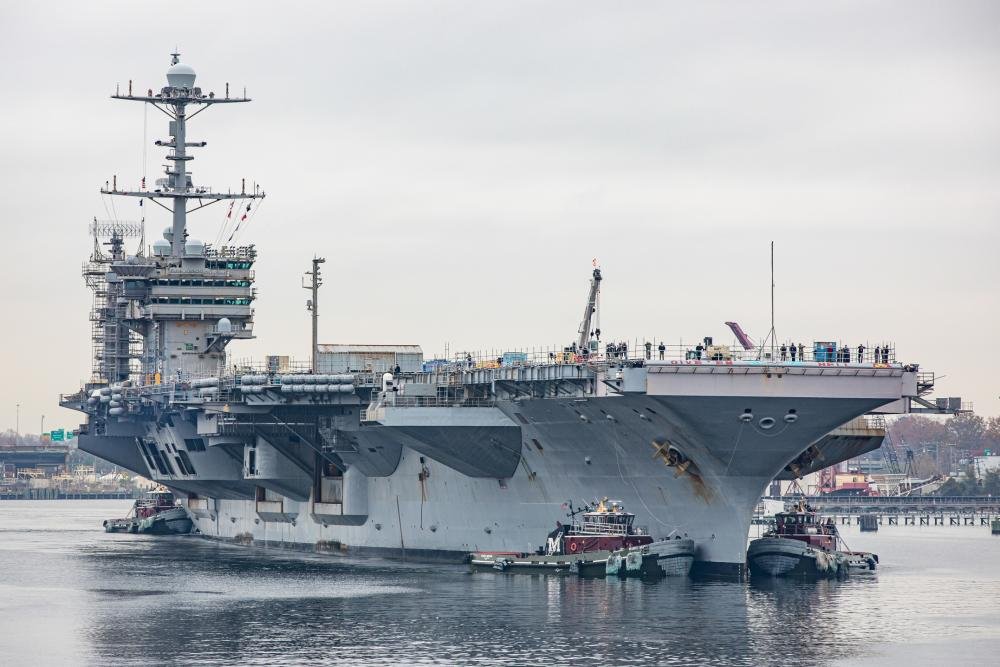Norfolk Naval Shipyard (NNSY) welcomed USS Harry S. Truman (CVN 75) Dec. 7 in advance of its scheduled Planned Incremental Availability.
Truman entered NNSY following its extended nine-month deployment in response to Russia’s unprovoked invasion of Ukraine. The overhaul on Truman comes quickly on the heels of USS Dwight D. Eisenhower (CVN 69) departing the shipyard Nov. 16 following its own Planned Incremental Availability.
The Truman project team has been preparing for this availability through the close partnership with Carrier Team One and leveraging lessons learned from recent carrier availabilities at both NNSY and Puget Sound Naval Shipyard and Intermediate Maintenance Facility (PSNS & IMF). Truman team members traveled to PSNS & IMF to observe execution in action and discuss challenges that may arise during the availability and how to effectively mitigate them. Project Superintendent B.J. Baker says the Truman team also stands to benefit by “upholding back-to-basics principles with the standards of Project Management Fundamentals.”
An innovation during this availability that will be incorporated across the Naval Sea Systems Command (NAVSEA) corporation is using freeze seals to perform fire main system maintenance. Using freeze seals helps maximize the fire main system remaining online during availability, helping to maintain the carrier’s in-port emergency response capabilities.
Truman will be NNSY’s second carrier project to implement Naval Sustainment System—Shipyards (NSS-SY), a process improvement initiative across the four public shipyards to improve on-time delivery of ships back to the Fleet. One of the key practices of NSS-SY Truman is using is an Operations Control Center (OCC) with the team collocated in the hangar bay. “The OCC is set up to drive communication and quickly resolve issues as they occur within the project,” said Shipyard Commander Capt. Dianna Wolfson. “That means when a problem occurs on the deckplates that can’t be quickly resolved, mechanics, supervisors and zone managers have a place to take those issues. Like a well-oiled machine, the OCC team works together to find solutions to drive non-stop execution and will also look to the future for removing barriers in advance to ensure being able to execute the plan.”
The majority of the project team and carrier leadership supported Truman’s last overhaul at NNSY, an Extended Carrier Incremental Availability which completed in May 2021. “That set the stage for continued collaboration between the shipyard and Ship’s Force team,” said Baker. “In addition, the project team worked with the ship’s Advanced Planning Team for nine months prior to the original start date of the availability. Weekly calls with the ship six months prior to its arrival at Naval Station Norfolk were held to build on our communication and teaming. The team also took advantage of opportunities to fly out to the ship to conduct project review conferences and advance training to further build our team.”
“Our preparation for the maintenance mission transition began over a year ago alongside the Norfolk Naval Shipyard project management and trade professionals,” said Truman Commanding Officer Captain Gavin Duff. “The diligence and dedication our crew exemplified during deployment, combined with our opportunity to serve alongside Capt. Wolfson’s professionals, will be key in completing the modernization and repairs needed for Harry S. Truman to return to sea and ready for national tasking. It is also a chance for our team to focus on their personal and professional development as they reinvest in themselves.”
With the availability not scheduled to officially start until early next year, the Truman team is taking advantage of having the carrier in place to get all facilities and services set up to fully execute come January.
“Our extensive preparations for conducting major maintenance on this critical national asset positions us well moving into the start of Truman’s availability in early January,” said Wolfson. “For the past several months, our project team has aligned on goals and standards using proven Project Management Fundamentals and, with valuable input from our stakeholders, self-assessed some of our biggest challenges on this project. Now as we move into execution, we can self-correct and improve by fixing or elevating barriers as they arise all while continuing to build a winning and unified team founded on ownership, trust and respect. All of this great planning, problem solving and partnership will help us return Truman to the Fleet on time and ready to ‘give ‘em hell!’”

